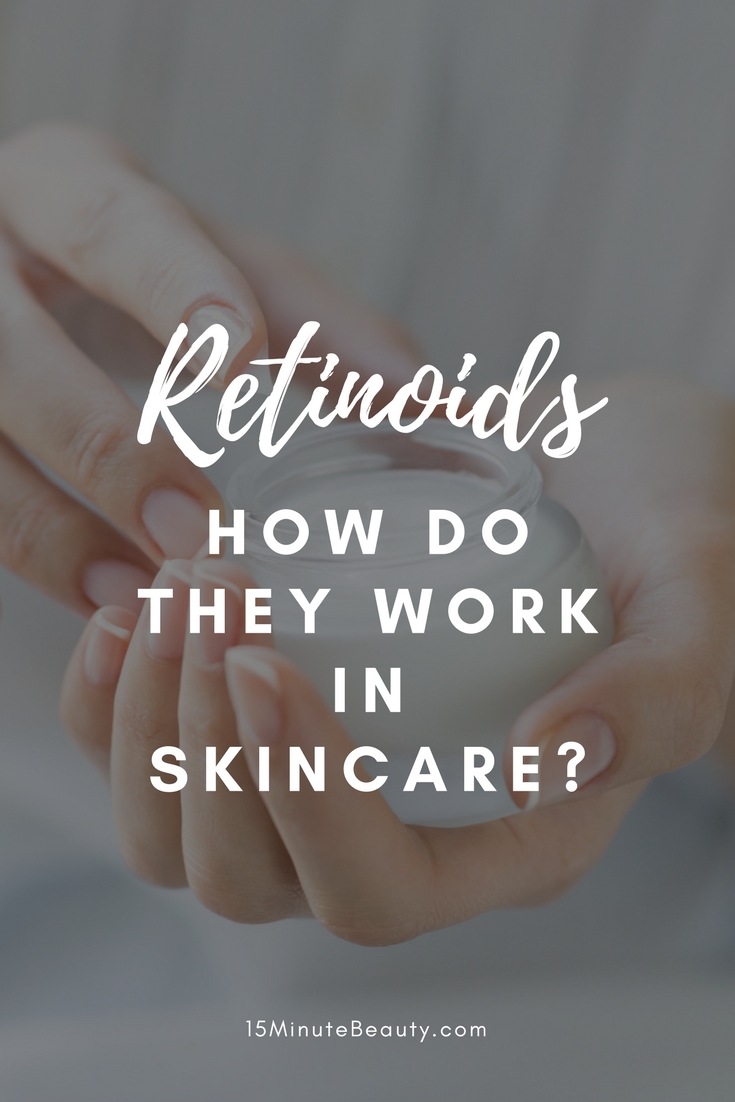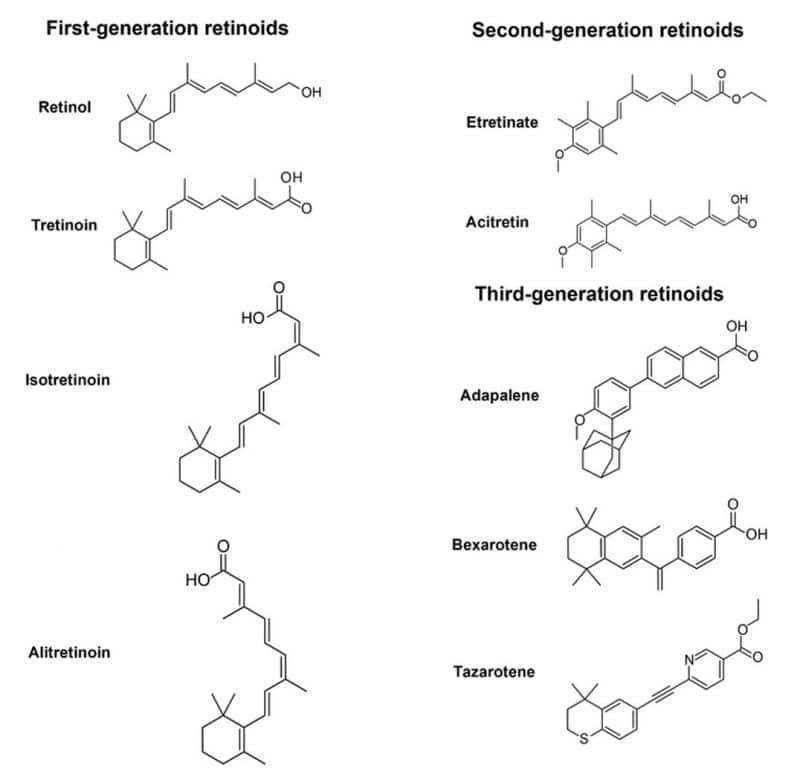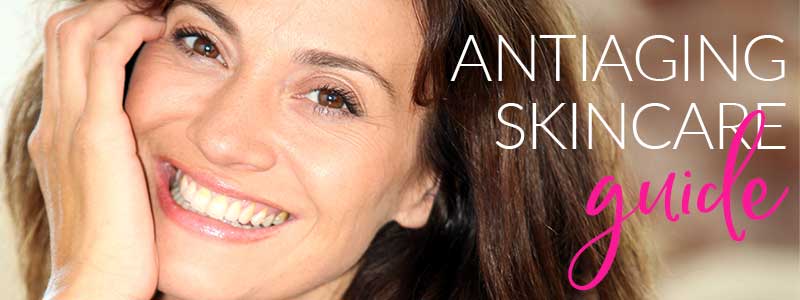So, the big question is “why is everyone always so excited about retinoids?” How do retinoids work in skin care and are they really an ingredient everyone needs to incorporate into their skincare routine?
There’s a good reason. They’re really considered the Gold Standard for a topical, anti-aging skincare product. In study after study, retinoids are the ingredients that have helped reverse fine lines, wrinkles, even out skin tone and they even help acne. They have the most evidence, and their results are better than other active ingredients.
“Retinols and retinoids are BY FAR the best ingredients in dermatology, and especially when it comes to anti-aging. They stimulate increased cell turnover and remove the excess debris that clog pores. I like to refer to this as the ‘detoxing’ phase of skin rejuvenation. Benefits include evening out skin tone, decreasing acne, shrinking pores, decreasing redness, improving hyperpigmentation, increasing cell turnover, and most importantly, stimulating collagen which improve the appearance of wrinkles. Bottom line – everyone should use them!”
-Dr. Dhaval G. Bhanusali, a dermatologist in New York City.
Read on to learn more about how retinoids work, things to watch out for, and how I incorporate this magical active ingredient into my skincare routine.
Image: WikiMedia
What are Retinoids?
Retinoids aren’t just one ingredient, instead it is a huge collection of ingredients that are chemically related (and can often interconvert amongst themselves once on the skin). Initially, they were all derivatives of Vitamin A, but as the compounds have become more advanced a retinoid has come to mean any compound that can act through the retinoic acid receptor (which is a naturally occurring Vitamin A metabolite).
Some names you might recognize:
• Beta-Carotene
• Retinol
• Retinoic acid
• Retinyl Palmitate
• Retinyl Esters
• Retinaldehyde
Some of these forms are only available via prescription from your doctor. The most common forms you’ll see available over the counter are retinol and retinyl palmitate, both of which are converted in the skin to all-trans retinoic acid before they are active. Retinol generally does this a bit easier than retinyl palmitate, which is part of the reason why it is thought of as a bit stronger, both in terms of efficacy and side effects. Retinol has also been found to penetrate into the skin more easily than other over the counter retinoids.
How do Retinoids Work in Skincare?
What is perhaps the most interesting thing about retinoids (at least to me) is that they don’t work just one way. No. They like to be complicated and do a ton of things to your skin. I’ll go over some of it here, but if you want to cut to the chase then skip down to the next headline, Long Story Short.
What Happens at the very Micro Level:
1.) Through the Retinoid Receptor
It’s easy to say that there’s a retinoid receptor, but the real story is that there are many retinoid receptors, and they’re in fact divided into two major categories, the retinoic acid receptors (RARs) and the retinoid X receptors (RXRs), and from there they are further subdivided into types.
In general, what happens is that the retinoid compound binds with a protein, cellular retinoic acid binding proteins I and II (CRABP I and II) or cellular retinol binding protein (CRBP), and then in turn those together act on the receptor, and then the whole thing works to affect how the cells behaves. In general, they either increase the activity of certain genes or decrease the activity of certain genes.
2.) Via Matrix Metalloproteinases (MMPs)
MMPs are enzymes found in the skin that break down collagen and other structural skin molecules, and they are increased in the skin after exposure to UVB waves from the sun. In addition to increasing the amount of degrading enzymes in the skin, UVB radiation directly decreases the skin’s production of collagen within 24 hours.
With application of a retinoid, the skin produces less MMPs after sun exposure. And pretreatment of the skin with a retinoid also prevents the decrease in collagen production. So, skin continues to make collagen at the same rate and won’t make as much of the degrading MMPs.
What this Means for the Skin:
It’s easy to say that the retinoids act upon the cells to turn certain genes on and off, but what are the overall results of those changes? And what does that mean for your skin’s overall health and appearance?
Retinoids cause the cell to increase your thickness of the epidermis, increase collagen production and decrease collagen break down through decreased production of those MMPs. They increase cell turnover as well, so your skin is better able to exfoliate on its own, but it also produces more new skin cells. This in turn helps to even out skin tone over all. The skin also decreases sebum production.
How Retinoids Work: Long Story Short
Once again, we should just read what Dr. Bhanusali had to say, “they stimulate increased cell turnover and remove the excess debris that clog pores. . . Benefits include evening out skin tone, decreasing acne, shrinking pores, decreasing redness, improving hyperpigmentation, increasing cell turnover, and most importantly, stimulating collagen which improve the appearance of wrinkles. Bottom line – everyone should use them!”
Things to Watch Out For When Using Retinoids
Almost everyone gets side effects from using a retinoid, but the good news is that they can be managed, and over time they seem to decrease as your skin adjusts to using the retinoid. As well, newer retinoid compounds seem to have less severe side effects, and over the counter retinoids tend to be easier to tolerate (though it can take a little longer to see benefits).
The main issues will be skin irritation, with dryness, scaling of the skin and even redness. This is especially true with higher concentrations or more effective forms. You can combat this by decreasing your use of the retinoid, think using it every other day or even on an every third day schedule. Let your skin tell you what it can handle.
“Retinols and retinoids can certainly take some time getting used to. I generally have my patients use them every other night to start with copious moisturizer use before and after application. Over 3-4 weeks, I have them start increasing it to nightly as tolerated but again, with aggressive use of moisturizer applied directly before and about 20 minutes after, as well as every morning, with an spf 30,” says Dr. Bhanusali.
More Retinoid Posts
How to Add Retinoids to Your Skincare Routine
The Best Over the Counter Retinoids to Help Fight Aging
Check out more anti-aging skincare information and reviews in my guide!




 I’m a doctor, a mommy and a bit of a beauty addict. If you let me, I can take 2 hours to get ready in the morning. Really. I'm on a quest for faster beauty that works!
I’m a doctor, a mommy and a bit of a beauty addict. If you let me, I can take 2 hours to get ready in the morning. Really. I'm on a quest for faster beauty that works!
Hi!
Thanks for all the info. How long do retinoids stay in your bloodstream? If I’m nursing only a few times a day is it safer to use?
No, it doesn’t work that way. This isn’t a pump and dump situation.